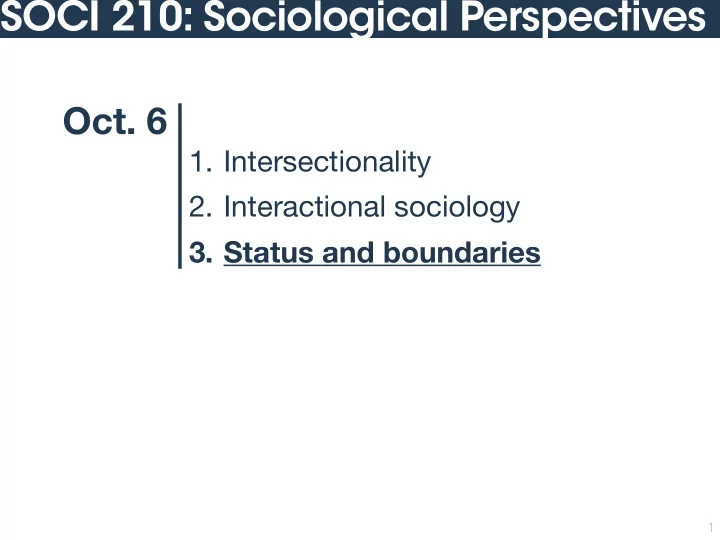

SOCI 210: Sociological Perspectives Oct. 6 1. Intersectionality 2. Interactional sociology 3. Status and boundaries 1
Social Status and Roles 2
Status and roles Social status and social roles ⦙ Interaction between status and roles is central to interactional sociology Status ⦙ Perceived categories that others use to define us ⦙ Ascribed status Gender, race, age, … ⦙ Achieved status Profession, popularity, wealth, … Roles ⦙ Expectations of behavior based on status ⦙ Roles learned through socialization 3
Status and roles Interplay of status and roles ⦙ Status sets and role expectations are co- constitutive ⦙ Constant, repeated interaction solidifies status and defines role expectations ⦙ Without repeated interaction, roles are di ffi cult to define Expectations rely on previous experience or accounts Status Role 4
Status and roles Status hierarchy ⦙ Status is in an implicit hierarchy ⦙ Wealth, profession, race, gender “Status characteristics” that inform high- versus low-status ⦙ Realized in interaction People in high-status jobs get used to deferential treatment People accustomed to disregarding Still from Trading Places (1983) those in poverty Status mismatch ⦙ Certain statuses are assumed to ‘go together’ College degree and employment Homemaker and women ⦙ Notable when those assumptions are subverted Well-payed garbage collector Men doing childcare Still from Trading Places (1983) 5
Boundaries , Status , and Class 6
Boundaries and class Social status Permeable status categories ⦙ Social Status : Honor or prestige ⦙ Status is attributed using cultural attributed to one’s position in categories society ⦙ Membership in status categories is ⦙ Status groups share styles, tastes, constructed culture ⦙ Social status requires agreement Max Weber; Pierre Bourdieu Membership requires the agreement of others those in poverty Still from 7 Mean Girls (2004)
Boundaries and class Scene from Pretty Woman (1990) https://www.youtube.com/watch?v=wj-aGzw9wXY 8
Boundaries and class Boundary processes • Social process of inclusion and exclusion • Criteria establish di ff erence, draw boundaries, distinguish • Happens in all kinds of groups How to dress How to act Right jokes to make Right way to make plans Cultural touchstones … Images: http://1.bp.blogspot.com/-c-M4pmcneFY/UyyMnXd-gyI/AAAAAAAAAPY/XyB-smamA88/s1600/julia-roberts-pretty-woman-red-dress.jpg https://ca.hellomagazine.com/imagenes/celebrities/2017031037248/julia-roberts-character-in-pretty-woman-wasnt-meant-to-have-a-happy-ending/0-200-483/julia-roberts-a.jpg 9
Boundaries and class Status boundaries defined by hierarchy • People excluded from status categories ‘above’ • Status boundaries helps people distinguish themselves from those they perceive as lower- status Social class • One way to think about class: bundles of status categories associated as one • Class is established by ability to navigate clusters of social boundaries • To be high-class you must ‘pass’ as high-class 10
Recommend
More recommend